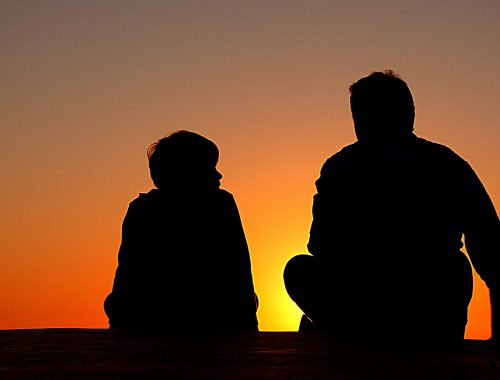
Only So Much You Can Do
Friday dinners at our house are as simple as we can make them — as simple as any dinner can be for two working parents and two growing boys who eat their weight in food.
Frozen pizza from the oven, raw vegetables from the fridge. Maybe gelato for dessert. We watch re-runs of an old sitcom while we eat and manage to clean up the dishes by 7:30 p.m.
After putting in a full week at work, I am usually dragging by then. By the time we all fall into our beds, I pass out cold.
On Saturday, after a good long sleep, the weekend starts. And I always think I will have hours of time for contemplation, for reading, for writing.
For just being in my skin and figuring out what the last week meant, and what I need to tackle the next one. For long conversations with my kids, or my husband. For old movies. Or any movie.
I am always wrong.
For years, my weekend plans revolved around getting as many chores done as possible. If I devoted all those extra hours to getting everything done for the coming week, I was sure that magically uninterrupted hours would appear before me.
Suddenly I would reach some fairy tale realm of quiet and ease that I could visit daily.
Suddenly, life would be comfortable, manageable, and sweet. Suddenly, all would be rainbows and — well, queue the soaring music and inspirational dream sequence.
As you can guess, suddenly never came.
Suddenly the weekends were over, and the weeks were still full of work, meals, dishes, laundry, cleaning, parenting, and adulting, no matter how well I planned.
Not so suddenly (more like “painfully slowly”, like Sisyphus pushing the same damned rock up a hill 14,000 times) I decided that, yes — after doing so very much for so very long with so very little to show for it except more stuff to do — there is only so much I can do.
I still plan my weekends around getting things done to make life a little easier. I still make meals for my kids, and keep a reasonably clean house, and I’m still a darned good employee.
But these days, I also let myself be tired, let my husband do the laundry, forget how long my kids have been playing video games today so I can sit and think and write.
I am trying to honor my need for quiet. For stillness. For the desire to take my own pulse and figure out where I am right now, and who I want to be from now on.
I have learned that much from reading about highly sensitive traits and the needs of HSPs, from knowing other HSPs, and from acknowledging how long I have neglected my own highly sensitive spirit.
But, as with most deep lessons (and as with most HSP experiences), there are so many layers to this idea of only so much.
My childhood swung from normal to incredibly painful on an almost daily basis. I remember crying silently in rooms full of people. I remember biting my tongue so that I could concentrate on one simple pain inside instead of the overwhelming pain bearing down on me from outside.
I remember promising my thirteen-year-old and future self that I would never hurt anyone this much or this badly in my whole entire life, so help me God. I would never marry or have children, closing the door to any opportunity to repeat such pain.
It took me much of my adult life to realize that there was only so much I could do as that little girl. I couldn’t save anyone but myself.
I survived, I still loved, and I eventually found a therapist who intuitively recognized my highly sensitive traits and honored them. I even married, had children. I did all the hard emotional work and did all I could not to repeat my parents’ mistakes.
After my husband and I had been married for a few years, I began to feel some deep unease.
I could feel it in myself, and in my husband, too. But he didn’t feel it at all. And even though I sensed he had a deep anxiety he was running from, and that he was running harder and faster every day, he kept assuring me everything was fine.
After fifteen years of marriage, and some subtle and not-so-subtle conversations about what I sensed in him, he ran headlong into the monster he had been running from.
Even though I felt I had, in a sense, ripped the cover off a wound he didn’t know was there, I had to admit that there was only so much I could do to help him navigate that treacherous terrain.
To his credit, he found his way back from that place. And eventually, we both found our way to a new place — a better place in our marriage.
And then, a few months ago, another hard lesson in there’s only so much…
My oldest son is a highly sensitive as well. I recognized a special connection to him from the beginning, but definitely by the time he could speak, I knew he was wired like me. At that time, I didn’t have words for the traits we share. Now I know he fits the definition of highly sensitive in many ways.
He’s sixteen now, and in high school. He likes art, animation, and writing comedic scripts that he acts out and films himself. We bond over books, over animals (stuffed and wild), and writing.
And when I finally read about what a highly sensitive person is and what they need to thrive, I recognized that we had already been giving him a lot of what he needs — time to think, the space to create, and an environment that nurtures and values his sensitive and intuitive side over being “manly.”
But after reading Elaine Aron’s book, I was convinced that I would have an even deeper understanding of his wiring and mine. And, armed with that knowledge and conviction, I would be able to help him navigate this difficult terrain.
I would be able to teach him exactly how to take care of himself, to avoid the depths of sadness that sometimes come with knowing and feeling too much. I would teach him and he would know.
I was convinced of all of this, even though I am still learning (as we all are) how to do all of this myself.
So a few weeks ago… my two sons were downstairs arguing over something. Anger erupted. My oldest son lashed out, as teenagers sometimes do, and hurt his younger brother.
Without violating his privacy, let me just say that my highly sensitive son instantly turned his mistake inward, blamed himself and punished himself far more than we did, and much more than was necessary.
I remember leaning toward him and looking into his pained eyes, recognizing the panicked feeling of overwhelm on his face, and trying desperately to talk to him.
No matter how much I could feel everything he was feeling — and no matter how much insight and knowledge and vocabulary I had to tell him that this was all normal and didn’t make him crazy or a monster — there was only so much I could do for him.
Like a rock in my heart. Like a punch to the gut. Like a hard lesson hitting you in the face after you thought you’d already accepted the wisdom.
Only.
So.
Much.
No matter how much we can intuit someone else’s pain, no matter how much we understand what they may not, no matter how much compassion and empathy and knowledge we may have, there will be times (too many times, probably) when there will be only so much we can do, even with all of our gifts.
I’m sure every parent out there who connects deeply with their children learns this lesson. I know older parents will smile painfully at my naiveté, and for my stating of the obvious. But I think for HSPs, this fact is harder to admit, this lesson harder to learn.
As HSPs, we know. We feel the truth of things, on all levels. And many of us feel responsible to use these gifts to fix things, make things better, make ourselves better.
And the thought of there being only so much we can do sometimes sounds like giving in, or giving up. But perhaps if we stop focusing on the only and concentrate on the so much, we can find the wisdom in this lesson.
We feel so much. We intuit so much. We know so much so deeply. These are our gifts. And in order to put those gifts to good use, we need to acknowledge that the only is not a weakness in the system, but a guarantee that so much will be available when we need it most.
We need downtime. We need quiet. We need fewer chores, and more sleep.
We can’t fix everything, we can’t know things for someone else, and we aren’t superheroes (even though we may have ‘superpowers’).
We can only do so much.
But when an ordinary human being needs extraordinary kindness, empathy, and understanding — when we can use our deep knowing to bring deeper meaning to our lives, and to others — then we have done so much to honor ourselves, our gifts, and this life.
∗ ∗ ∗ ∗ ∗
Last night I visited a woman who is like a grandmother to me, and a best friend. Her name is Mrs. Fox. My grandmother and Mrs. Fox’s mother lived in houses facing each other across a country road and were dear friends.
Because I’ve known her since I was small, she was always “Mrs. Fox” to me, even though we are old and dear friends, too.
When we bought our house twenty years ago, I hadn’t seen Mrs. Fox for years. I had grown up and gone away to college, lived in the city, came back to the country, and gotten married.
And then, there was Mrs. Fox stepping out of her back door to say hello — the door that just happened to face our new house.
From that day on, Mrs. Fox was part of my daily life. It was like coming home. And since that was the same year I started saying a long goodbye to my own grandmother who had a stroke at eighty-six, it felt like a gift.
A second grandmother, one who knew my family, my parents and my aunts and uncles when they were young, before my story started.
We spent hours at her kitchen table, on her porch swing, in our backyards (she knew every plant, and we fed all the birds and squirrels in the town), and moments at the back door before I left for work, after I came home at night, and while still in my pajamas on weekends, and she still in hers, inviting me into the kitchen.
Mrs. Fox was like home to a lot of people. She never had kids of her own, but she had a small group of folks that she considered her children, and they called her “Mamma.” And eventually, over the years I shared with her, I started calling her “Mamma,” too.
Last night I visited Mamma in the assisted living facility she moved into a little over a year ago.
Her 91st birthday will be on August 30th, a week from now. We don’t know if she will be here to celebrate. So last night, while sitting by her bed and holding her hand, as she looked at me with her beautiful blue eyes, and said my name, I was again reminded that there is only so much we can do.
I stroked her hair. I told her how much I love her. I reminded her that she’s my grandmother, and my best friend.
In those moments, only becomes clear. In those moments — as others struggle with awkwardness, fear, and the unknown — my deep knowing allows me to sit with others in that only. And I have sat with many. In those moments, my sensitivity seems the greatest gift.
In those moments, our only really is so much more.





